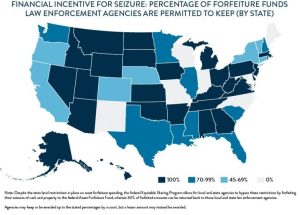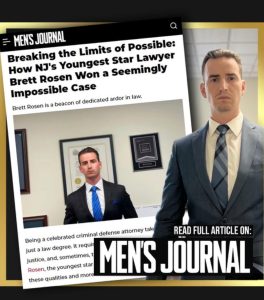What is Civil Forfeiture in Union County, NJ? Understanding the Law and Protecting Your Property
Civil Forfeiture in Union County, NJ

What is Civil Forfeiture in Union County, NJ?
Civil forfeiture is a powerful tool used by law enforcement in New Jersey to seize property that is allegedly connected to criminal activity. It’s a complex and often controversial process that can result in the loss of your assets, even if you haven’t been convicted of a crime. If you’re facing the possibility of civil forfeiture in Union County, NJ, understanding your rights and securing experienced legal representation is essential.
Brett M. Rosen, Esq., a skilled criminal defense and civil forfeiture attorney in Elizabeth, NJ, is dedicated to protecting the rights of property owners facing forfeiture actions. He understands the intricacies of New Jersey’s forfeiture laws and will fight tirelessly to help you keep your property.
Understanding Civil Forfeiture in New Jersey
Civil forfeiture is a legal process that allows the government to seize property that is allegedly connected to criminal activity. Unlike criminal forfeiture, which occurs after a criminal conviction, civil forfeiture is a separate civil proceeding against the property itself, not the individual. This means that your property can be seized even if you are never charged with a crime.
New Jersey’s Forfeiture Statute:
The primary law governing civil forfeiture in New Jersey is N.J.S.A. 2C:64-1. This statute allows the state to seize property that is:
- Used in the commission of a crime: This includes vehicles used to transport drugs, weapons used in a robbery, or computers used for cybercrime.
- Derived from criminal activity: This includes money obtained through drug trafficking, proceeds from fraud, or assets purchased with illegal funds.
- Intended to be used in criminal activity: This includes property that is intended to be used in the future to commit a crime, such as materials for manufacturing drugs or weapons.
The Forfeiture Process:
The civil forfeiture process typically involves the following steps:
- Seizure: Law enforcement seizes the property they believe is subject to forfeiture.
- Notice: The property owner is notified of the seizure and their right to contest the forfeiture.
- Filing of a Complaint: The prosecutor files a complaint in court, initiating the forfeiture action.
- Answer: The property owner must file an answer to the complaint, contesting the forfeiture.
- Discovery: Both sides may engage in discovery, exchanging information and evidence related to the case.
- Hearing or Trial: A hearing or trial is held to determine whether the property is subject to forfeiture.
- Judgment: The court issues a judgment, either forfeiting the property to the state or returning it to the owner.
Potential Defenses Against Civil Forfeiture
Challenging a civil forfeiture action requires a strong legal strategy and a thorough understanding of the law. Attorney Rosen will explore every possible avenue to protect your property rights. Some potential defenses include:
- Lack of Connection to Criminal Activity: If you can prove that your property was not used in, derived from, or intended to be used in criminal activity, it should not be subject to forfeiture. This could involve demonstrating that you were unaware of the illegal activity, that the property was used without your knowledge or consent, or that the property was acquired through legitimate means.
- Innocent Owner Defense: If you are an innocent owner who did not know about or consent to the illegal activity, your property may be protected from forfeiture. This defense is often used by family members or spouses who were unaware of their loved one’s criminal activity.
- Excessive Fines Clause: The Eighth Amendment to the U.S. Constitution prohibits excessive fines. If the value of the property seized is disproportionate to the severity of the alleged crime, your attorney can argue that the forfeiture violates the Excessive Fines Clause.
- Lack of Probable Cause: The government must have probable cause to believe that the property is subject to forfeiture. If there is insufficient evidence to connect the property to criminal activity, your attorney can challenge the seizure.
- Procedural Violations: The government must follow strict procedures when seizing and forfeiting property. If there are any procedural violations, such as improper notice or an unlawful seizure, your attorney can argue that the forfeiture is invalid.
FAQs About Civil Forfeiture in New Jersey
What types of property can be seized through civil forfeiture?
A wide range of property can be seized, including cash, vehicles, real estate, bank accounts, jewelry, and other valuables.
Can my property be seized even if I’m not charged with a crime?
Yes, civil forfeiture is a separate civil proceeding against the property itself, not the individual. This means your property can be seized even if you are never charged with a crime.
What happens to my property after it’s seized?
The property is typically held by law enforcement pending the outcome of the forfeiture proceedings. In some cases, the property may be sold or auctioned off, even before the case is resolved.
How can I get my property back?
You must contest the forfeiture by filing a claim and participating in the legal proceedings. An attorney can help you navigate this process and present a strong defense.
How long do I have to contest the forfeiture?
There are strict deadlines for contesting a forfeiture action. It’s crucial to contact an attorney immediately to ensure you meet these deadlines.
FAQs Continued
What is the burden of proof in a civil forfeiture case?
The government has the burden of proving by a preponderance of the evidence that the property is subject to forfeiture. This is a lower standard of proof than in a criminal case, where the government must prove guilt beyond a reasonable doubt.
Can I get my attorney’s fees paid if I win the forfeiture case?
In some cases, you may be able to recover your attorney’s fees if you successfully challenge the forfeiture.
What if I can’t afford an attorney?
If you cannot afford an attorney, you may be eligible for legal aid or pro bono representation.
Can the government seize my property based on suspicion alone?
No, the government must have probable cause to believe that the property is connected to criminal activity before they can seize it.
What if I borrowed the property to someone else who used it in a crime?
If you can demonstrate that you were unaware of the illegal activity and did not consent to the use of your property in a crime, you may be able to use the innocent owner defense to protect your property from forfeiture.
Don’t Face a Criminal Charge in Union County Alone!

Civil forfeiture is a complex and often controversial process that can result in the loss of your valuable property. If you’re facing a forfeiture action in Elizabeth, New Jersey, don’t face it alone. Contact Brett M. Rosen, Esq., today for a free consultation. He will provide you with the experienced and dedicated representation you need to protect your property rights and achieve the best possible outcome.
908-312-0368 & brett@nynjcriminalcivilesq.com
Remember: Your property is worth fighting for. Don’t let the government take it without a fight.
